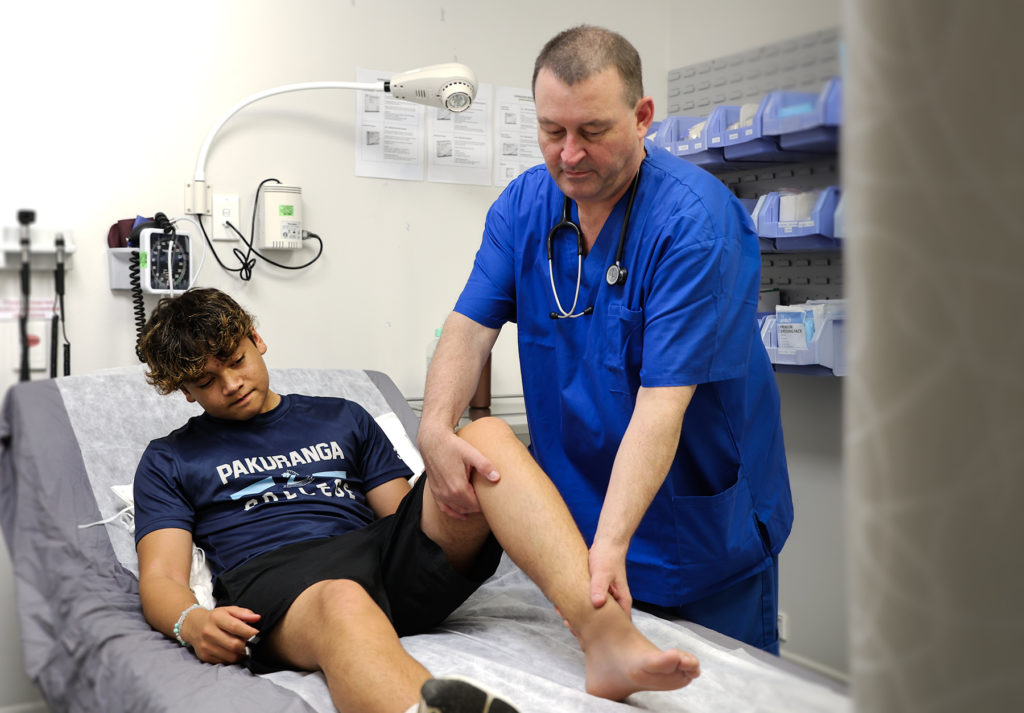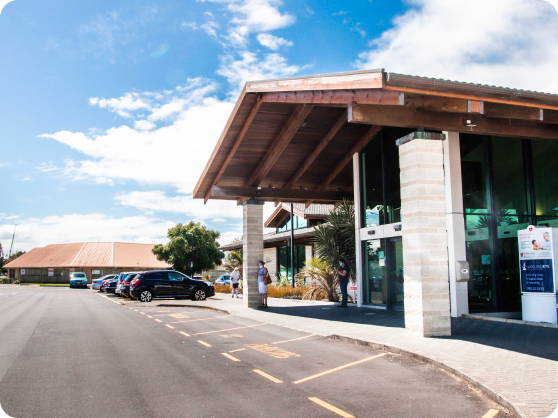Broken Bones & Fractures
Unsure if you’ve broken a bone, got a fracture or a sprain? Whether the bone is broken or fractured, start with first aid. Next, you’ll need urgent or emergency fracture care following an accident.

Have a life threatening emergency?PHONE 111
What is a fractured bone?
A fracture is a broken bone and can happen in any part of the body. From the spine, limbs, and ribs to fingers and toes, fracture accidents need first aid, then urgent care. And in some cases emergency care.
- Falls or accidents on bikes or cars often cause broken bones.
- Sporting injuries are another common reason for bone fractures.
- Commonly, you might think you have a sprain, but a fracture has occurred.
All these injuries happen when a lot of force is inflicted on the bone, while in elderly people with brittle bones from conditions like osteoporosis, a very minor injury can cause a fracture.
Symptoms of a fractured bone
Watch out for these symptoms following an accident. Start first aid for a fracture, then you’ll need to come to Urgent Care.
- Intense pain, made worse by movement
- Shock, which causes dizziness, chills and nausea
- Swelling, bruising and obvious deformity
- The injured person may have heard the bone break
- A bone may be poking out of the skin
- Heavy bleeding from the injury site
- No weight can be put on the limb
- The fingers or toes may appear blue, or cold, and the sensation can be altered i.e. pins and needles.
Types of bone fractures and breaks
The severity of the break can vary from a fine crack to multiple breaks in a bone. Possibly small and fragmented pieces of bone may break free (Comminuted fractures).
Fractures are broadly talked about as open or closed fractures. How these are treated depends on the break type and the fracture’s complexity.
- Open fractures or compound fracture is when a piece of the broken bone has pierced the skin. This will cause bleeding, and there is the possibility of the wound getting infected.
- Closed or simple fractures are a type of break where the broken bone remains inside the body. However, it is important to remember that there can be significant bleeding from a fractured bone like a femur or a thigh bone. Rapid urgent care is needed to treat shock and blood loss if you suspect this type of fracture.
- Comminuted fractures are more severe and difficult to treat because the bone is broken into many pieces. A surgeon will need to operate on a comminuted fracture in a hospital.
There are also other types of fractures like fracture-dislocations. Still, all suspected broken bones need to be looked at by a doctor for diagnosis and the correct treatment given.
Also, if you have osteoporosis, you will have a higher risk of breaking a bone. So, as part of preventative care, our clinic offers Aclasta Infusions.
First aid treatment for fractured broken bones
Broken bones are not always life-threatening but require rapid urgent care.
First, establish if you need an ambulance or to come to Urgent Care.
When to dial 111 for an ambulance:
Call an ambulance if you suspect a neck or back injury has occurred.
- Do not move the injured person if you suspect a neck or back injury. Tell the person to try to stay still.
- Keep them warm to treat shock and reassure them. Cover with a blanket or clothing.
- If an injury has caused the person to become unconscious or even briefly lose consciousness, they may have a fractured skull or brain injury.
- Check for heavy or uncontrolled bleeding. If possible, carefully elevate a limb and apply direct pressure over the wound. Treat for shock.
How to treat a fracture before coming to Urgent Care
Treat bleeding from any wound. Apply a dressing or clean cloth.
- Support a fracted limb on pillows or towels. Elevate if possible, then apply a cold pack, ice, or frozen peas wrapped in a towel for 10 minutes.
- Immobilise the limb with a splint if available.
- Apply a sling to an arm or support on a pillow or towels.
- Treat shock by keeping the person warm. Don’t give any food or fluids in case surgery is needed.
- Bring the injured person to our East Care Urgent Care clinic in Howick.
- Our doctors will examine the injury, and arrange further investigations like X-rays or scans. Often the injury can be treated in our fracture clinic, where the limb is realigned, and a plaster cast applied.
- For a more complex fracture (i.e. Comminuted fractures), usually the fracture can be treated by us and followed up in our fracture clinic avoiding the need to go to hospital at all.
- X-ray
- Plaster casting
- Radiology
- East Care fracture clinics
- Orthopaedic specialist referral through the Specialist Centre or Te Whatu Ora/Health NZ

How to contact us
- Email info@eastcare.co.nz
- Phone number (09) 277 1516
- Fax (09) 277 1515
- Address: 260 Botany Road, Howick 2013, Auckland
- Postal: PO Box 38306, Howick 2145, Auckland
Frequently asked questions
Patients are facing long wait times of 3-4 hours at our urgent care centre due to a shortage of appointments with primary care doctors and an influx of patients at the local emergency department. We are trying to add more staff to address this issue, but there is a nationwide shortage of nurses and doctors, which makes it difficult to find and hire new staff.
At East Care, patients are seen based on the severity of their condition, as determined by the Australasian Triage Standards. This means that patients are seen in the order of medical priority.
It's recommended that you visit your primary care doctor for regular medical care. GP's receive funding from local Primary Health Organizations (PHO’s) to care for their patients throughout the year. East Care doesn't receive funding to provide care when GPs are open, but they do receive some funding from Health NZ to provide care after hours. As a result, consultation charges may be lower in the evenings and on weekends.
East Care does not have access to your entire medical history, so they cannot provide repeat prescriptions. They can provide a temporary prescription in some urgent cases until you can see your GP for ongoing care.
East Care is an Urgent Care Centre that provides medical treatment for sudden illnesses or injuries. It is not a primary care facility who enrols patients and does not provide ongoing care. For ongoing medical care, it is best to be enrolled with a local GP. However we can see casual patients.
Our medical charges are for the time spent with the nurses, doctor, treatments and procedures. So, our advertised fees typically cover the cost of the examination, triage, assessment, diagnosis and treatment provided by the doctors and nursing staff. It also covers the administration requirements carried out by our reception staff during your visit.
Complementary onsite services
At our Botany Road premises, we offer a number of onsite services including a Pharmacy and Radiology to ensure your visit to the Centre is as stress free as possible.





